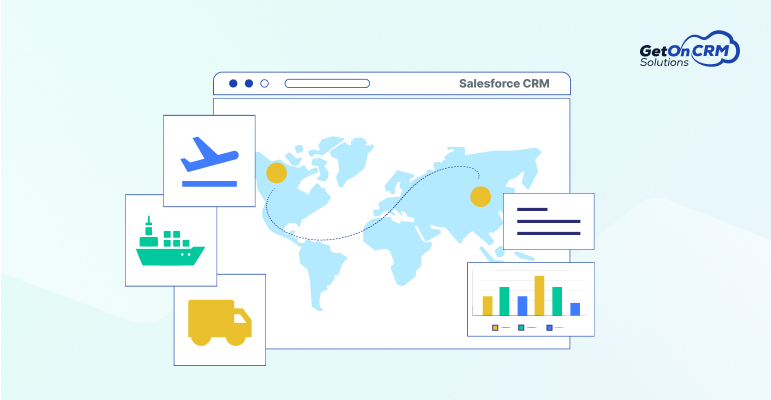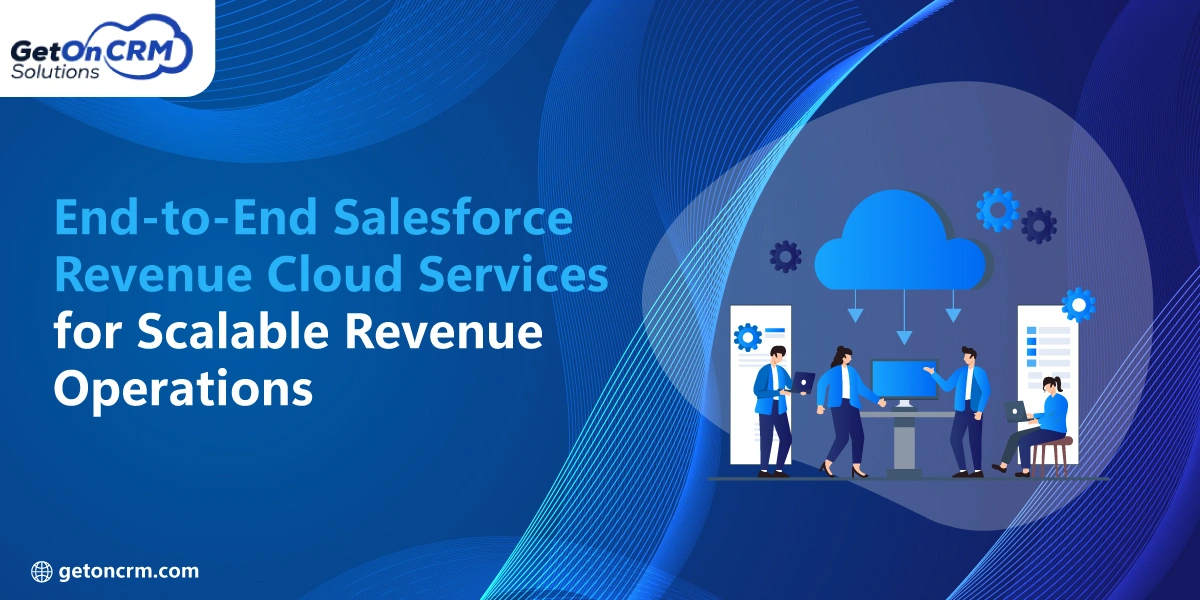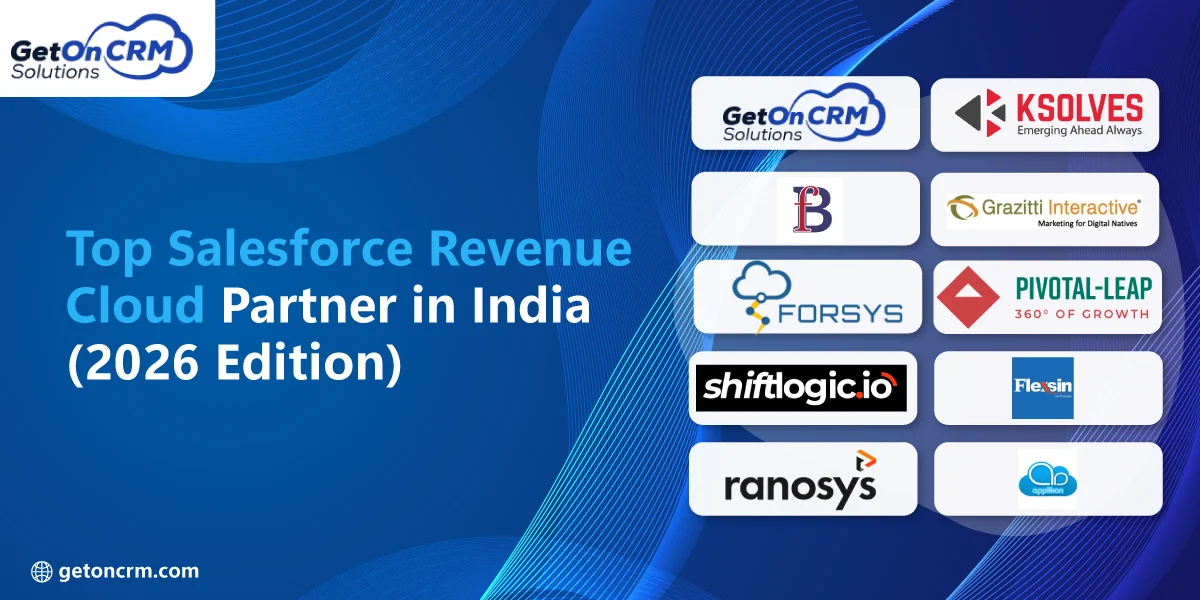As everything is getting digitalized, a drastic change has been observed in customer expectations. They are looking to shop for products with more personalized and superior experiences. It has been identified that the logistics and transportation sector plays an important role in the growth of the eCommerce industry during the post-pandemic period.
The order volumes have increased, and customers are looking for a real-time view of the whole supply chain process, including shipping, ordering, and tracking the ordered item. In such a scenario, it’s difficult for logistics companies to provide better customer experiences with the rising demands. However, integrating a salesforce solution for Logistics can fulfil all these customers’ needs.
It has been identified that Salesforce CRM integration services for the logistics industry have many benefits, with the optimization of marketing and sales, automating processes, analysis of data, and management of data to improve efficient customer service, collaboration with teams, and enhancement of strategic business decisions. This post will give you a great understanding of the Salesforce CRM relationship with the logistics industry and how it can bring success to your logistics business and let you know about its additional perks and benefits.
The Relationship Between Logistics Industry And Salesforce CRM
Salesforce is a comprehensive CRM solution with more than 19% of a broad customer base. This CRM platform is now integrated with different industries, and the logistics industry is also a part of that. Logistics companies can integrate salesforce CRM services to enhance the journey of shippers, travellers, and drivers from their origin place to the reaching destinations.
A highly dynamic environment is associated with the logistics industry, which needs proper data management, efficient supply chain management, and real-time control and tracking of logistics. In such a scenario, a salesforce Solution for Logistics is highly recommended because it helps the logistics companies to perform seamless logistic operations. Integrating salesforce within the logistics business can be profitable if you want to develop a strong long-term relationship with your prospects.
How Is The Integration Of Salesforce CRM Make The Logistics Business More Successful?
A logistic business always targets to achieve two crucial things – cost optimization and fast customer service. However, these goals can be achieved by focusing on logistic operations such as budget approvals, tracking, packaging, agreements, communication, warehousing, etc. Even there is a need to maintain collaboration among different departments and team members in the logistics business to streamline the operational process. Therefore, the integration of Salesforce CRM for the logistics industry focuses on certain factors to keep your business running and successful. The important factors include the following;
1. The document management board
2. Unified customer base
3. Order and lead management tools
4. Convenient UX and UI
5. Availability of devices anywhere, anytime
6. Easy to learn logistic operation principlesTo keep your business running and successful, you need to pay attention to these important factors by hiring the right Salesforce CRM consultant. Now, let’s understand the top benefits of integrating salesforce within logistics.
Also Read: Salesforce Best Practices To Follow For Transportation & Logistics
What Are The Benefits Of Salesforce CRM Integration In The Logistic Industry?
1. Give High Priority To Your Customer
It is crucial to give a seamless shipping experience with your logistic business to positively impact the buyer experience and shipper, either directly or indirectly. The integration of the service cloud and sales cloud allows you to respond quickly to a customer inquiry or request with the right updates in real time.
Moreover, you can also develop a connected supply chain management by optimizing your logistic business based on your best carrier rating and tender response time. This way, you, the customer, will get all the immediate updates about your shipments through chatbots.
2. Better Time Management
For all industries, it is crucial to have proper time management to operate the business. The same applies to the logistics industry. It has been observed that customers prefer only to repeat their orders if they have a good logistic experience with the service provider. Thus, it becomes important for the shipping and logistics industry to focus on better time management aspects.
Introducing a salesforce Solution for Logistics can give you better time management, planning materials, and client information. This way, you can prioritize jobs, organize the work conveniently, and make smart and quick decisions for logistic operations. Further, the salesforce platform also helps to keep track of lead timings to streamline and automate your logistic workflows by deploying the right staff at the right time.
3. Enhance Team Collaboration
The feature of the chatter tool in the salesforce CRM helps to improve the communication process among the team members. It helps to communicate with groups or people on work-related topics like territory, clients, or other significant detailed information.
This way, your logistic team can easily organize and prioritize their tasks, improve sales, and rise interaction with more leads. You must contact your nearby Salesforce CRM consultant to improve team collaboration and enhance your logistic operation.
4. Streamline Your Logistic Business Process
It has been identified that the salesforce Solution for Logistics offers customization features, which help to access and organize all the business data throughout the shipping journey with real-time transparency. This platform can streamline shipping through tracking, shipments, and order fulfilment.
When all the logistic business data is in one place, it helps to provide easy communication by eliminating duplication and confusion, providing easy access, and bringing improvement to the complete logistic experience. Further, you can use the cross-compatible dashboard feature to look into the data analytics and the business status.
This platform also allows you to set procedures and overview the SOP. It also allows you to access the cost metrics report to enhance the logistic process. In addition, the application of dual verification features allows you to identify fake orders and errors.
5. Collaborate With Partners
A complex network of partners is always associated with the logistics industry, which plays a significant role in running the whole supply chain management work. It has been identified that salesforce partners offer a trusted network for suppliers to obtain personal protective equipment. The integration of Salesforce CRM for the logistics industry allows you to collaborate easily with partners.
6. Strengthen Your Sales Representatives
Strengthening your sales representatives to enhance your logistic business performance is important. It has been identified that salesforce uses AI technology that helps to determine useful data about clients and procure predictive insights of the logistic business. It helps to strengthen your sales team to find the right opportunity and bring success to your logistic business.
7. Customize Your Customer Support Service
Salesforce CRM is the right platform to collect all business information in quantity and quality. This platform allows your sales representatives to use a hands-on approach to interact with clients to achieve better outcomes. It allows your business to focus on each account, contact, opportunity, event, and task related to an executive that offers relevant information to your company before letting you know your potential clients.
It has been identified that your logistics company can connect your staff with potential customers by providing customer data access to the customer care team. This way, customer interaction can be improved efficiency and in a more personalized way that can help enhance customer relationships, increase confidence levels, increase profitability, and enhance customer retention
Also Read: Reasons Why CRM Is Essential For SMBs
8. Recruit And Train Drivers
A driver plays an integral role in keeping moving the supply chain. Thus, it is crucial for transportation and logistics companies to recruit younger and more experienced drivers. You can find young drivers on social media platforms as they used to spend the most time on digital channels. The marketing cloud can help you find the right audience to filter the qualified candidates and their demographic data that meets your logistic company’s needs.
9. Get An Omni-Channel Network
Nowadays, customers prefer a unified and uniform business experience through different channels like SMS, phone, emails, or apps. The integration of salesforce within the logistics industry understands different communication channels and focuses on the customer approach to respond to them according to their needs. You can contact a professional Salesforce CRM consultant to provide your customers with a unified and uniform business experience.
10. Keep Track Of Your Competitors
As the competition increases, logistics companies need to keep track of real-time market trends, predict supply and demand trends, and determine high-propensity shippers. The integration of the marketing cloud can help to find new shippers and find the relevant signals.
Conclusion
Overall, the Salesforce CRM for the logistics industry empowers logistics companies to ease their business procedures and offers hassle-free customer service and better supply chain management. This CRM platform allows your business to get a complete view of your customers so that you can provide them with a personalized experience and transform your business-to-business sales.
It has been identified that lifeforce is also helpful in improving the journey of shippers, travelers, and drivers. There are many benefits that you can expect to get with the implementation of the salesforce in the logistics industry. Integrating Salesforce CRM with GetOnCRM’s Salesforce consulting services can enhance the efficiency of the logistics industry by streamlining key business processes and providing real-time insights into customer needs and preferences.
Frequently Asked Questions on Enhancing Efficiency in the Logistics Industry with Salesforce CRM Integration
How does Salesforce integration help logistics companies?
It centralizes order, shipment, and customer data. This enables better tracking, communication, and coordination across supply chains for smoother logistics operations.
Can Salesforce manage real-time shipment visibility?
Yes. Through integrations with tracking systems, it updates shipment status in real time, enabling proactive customer communication and internal alerts for delays.
How does Salesforce improve delivery coordination?
It automates route planning, dispatch workflows, and notifications. This reduces delivery errors and enhances coordination between drivers, warehouses, and customers.
What customer benefits come from this integration?
Customers get real-time delivery updates, transparent tracking, and timely alerts. This builds trust, reduces queries, and improves satisfaction.
Is integration costly or complex?
Complexity depends on existing systems. With proper planning and phased execution, integration costs can be managed, and ROI often outweighs investment.
Can logistics firms scale with this Salesforce setup?
Absolutely. As operations grow, Salesforce scales to handle more routes, partners, and data while retaining visibility and control.





















